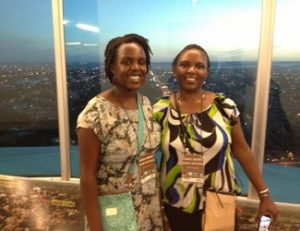Waru Gichane’s Research Examines Barriers to Achieving Optimal Health for Women
September 27, 2017
Waru Gichane is a doctoral student in the Department of Health Behavior within the UNC Gillings School of Global Public Health and a research assistant at the Carolina Population Center. Her research focuses on the individual, interpersonal, and institutional barriers women face in achieving optimal sexual and reproductive health.
When you were a child, what was your response to this question: “What do you want to be when you grow up?”
I had a really hard time making up my mind — on any given day I wanted to be a doctor, lawyer, actress, or journalist. By my senior year in high school, I decided I wanted to be a medical reporter like Sanjay Gupta on CNN so I could combine my interests in medicine and journalism.
Share the pivotal moment in your life that helped you choose research as a career path.
Spring of my sophomore year in college, I took a course that introduced me to concepts about population health. I was heading toward a career in medicine, but this class expanded my understanding of health outside of a clinical environment. My senior year I completed an honors research thesis exploring young women’s decision-making around birth control. From there, I knew I wanted to enter a career in public health research.

What’s an interesting/funny story from your time doing research?
The summer before my senior year, I was working on a project assessing waterborne diseases in a peri-urban area — the landscape between town and country — in Zambia. I was working with a Zambian college student to interview community members about water treatment practices, sanitation, and overall health. We repeatedly found that the water treatment practices recommended locally were too expensive for most people in the community and that the high incidence of diarrheal diseases due to poor sanitation in the area was less of a concern than the lack of economic opportunities locally. That gave me a lot of insight about using the priorities and needs of a community to drive the development of a suitable intervention, rather than just focusing on the immediate issue.
What advice would you give to up-and-coming female researchers in your field?
Do not underestimate your value to a research team. No matter where you are in the hierarchy, the work you do is essential to the project.
